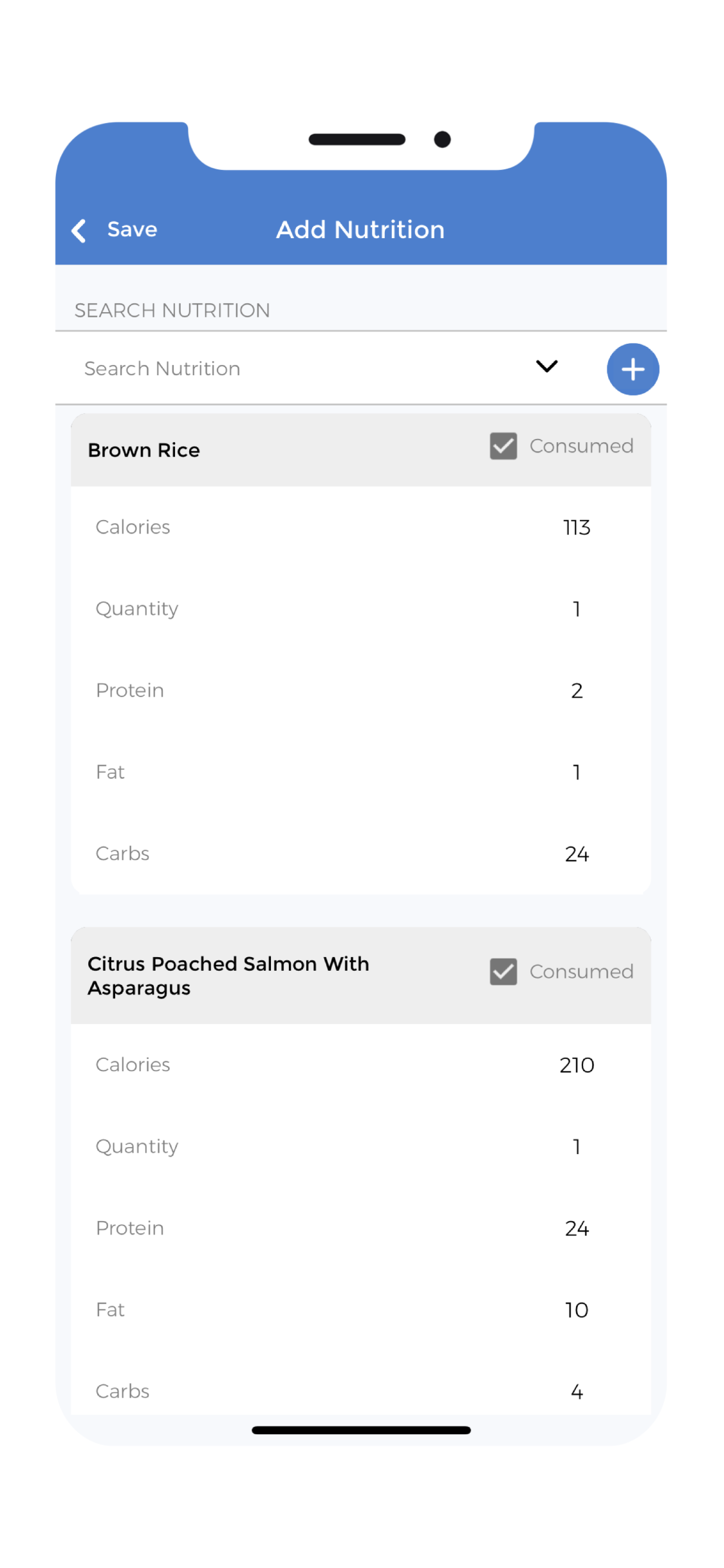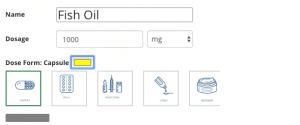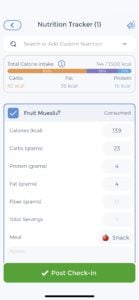![]()
If you are serious about losing weight, one of the first things you need to do is keep track of your food intake. And this does not concern only your meals, you need to go one step further and pay attention to the intake of calories using a calorie tracker app.
This is also valid for those who are trying to maintain the same weight, and even for those who are interested in gaining a couple of pounds. Thus a calorie tracker app is useful in quickly learning about where your intake is coming from and where you are expending your energy to get a net calorie intake amount.
Counting Calories
CareClinic is a health app that can be used, among other things, as an effective calorie intake tracker. You can log your meals and the associated number of calories, thus finding it easier to analyze your food choices and opt for the best weight loss solutions. With such applications, it will be simpler to keep the weight off on a long-term basis.
Counting calories is not difficult and apps such as CareClinic make the whole process a pleasure. All you have to do is log your meal and keep track of the calories consumed, taking advantage of the health diary to record additional information (for example, your current level of physical activity). The logged data will offer a clear picture of how many calories you actually consume in a day. You can calculate how many calories you consume each day and a total monthly average.
10 Benefits of Counting Calories
- You’re able to better monitor your calorie intake and make healthier choices.
- By knowing how many calories you’re consuming, you can better control your portions.
- Calorie counting can help you lose weight or maintain a healthy weight.
- It can also help you make better food choices by knowing which foods are higher in calories.
- Calorie tracking can also help you manage your blood sugar levels if you have diabetes.
- By keeping track of your calorie intake, you can also help to reduce your risk of heart disease.
- Calorie counting can also help to improve your cholesterol levels.
- If you have any food allergies, tracking your calories can help you avoid foods that trigger your allergies.
- Calorie counting can also help you make sure you’re getting enough nutrients in your diet.
- Tracking your calories can also help to motivate you to stay on track with your healthy eating goals.
Calorie Monitoring & Goal Achievement

Recording Nutrition in the CareClinic Journal
Upon deciding to lose weight, you will embark on a journey that will change your life forever. A lot of energy will be dedicated to keeping track of your food intake, the number of calories and so on. Apart from using CareClinic’s health app as a food calorie counter, you can rely on it to write about your feelings.
You can write daily entries about your mood and how you are feeling in general, identifying a connection between various states – angry, stressed, anxious, etc. – and food (emotional eating). Upon reviewing those entries, you will be able to change your diet for the better and reduce the risk of unhealthy cravings.
Additional Diet information You Can Track
Aside from tracking the overall caloric intake, the health app can be used to record other health measurements and general information about yourself. You can add your current and target weight, age, pre-existent conditions, blood pressure, blood sugar levels and so on.
You can record details about your physical activity level within the application. Be sure to mention the frequency of your workouts and how many calories you have consumed. You can also mention specific training, such as strength exercises or treadmill running, as well as any type of sport you prefer (swimming, biking, or running). If you are doing yoga or Pilates, be sure to mention them as well.
Customized profile in accordance with your needs

If you have a pre-existent condition, such as diabetes or chronic kidney disease, you might need to keep track of other health values. The application can be used to observe your blood sugar levels, as well as the intake of sodium, fiber, and other useful values. Based on the reports sent at the end of each month, you can talk to your doctor and inquire about potential lifestyle changes to be made.
Tracking macronutrients and micronutrients

It is also important to be aware of the fact that each macronutrient (R) has a different thermogenic effect. For example, you will burn more calories upon eating proteins and fiber, as these require more energy to be broken down (as opposed to fats and carbs).
Upon using CareClinic as an online macro tracker, you must first understand what macronutrients refer to. These are the major food groups encountered in our meals, meaning proteins, carbohydrates, and fats. When you add a meal into the application, you can break it down into macronutrients and register the content of each type (macronutrient percentages).
The accurate tracking will help you save a lot of time and energy, both of which you would have otherwise spent on guessing your overall intake of calories. By breaking your food down into macronutrients, you will be able to eat a balanced diet and achieve your diet goals.
At first, you might find it difficult to identify the macronutrients contained in each food. However, as you will get the hang of things, you will see that it is not as difficult as you thought. For packaged foods, do not forget to check the nutrition labels. You can also use the Internet to identify the macronutrients contained in fresh foods and then convert these into calories.
Tracking micronutrients
Micronutrients, on the other hand, refer to vitamins and minerals. You can use CareClinic to monitor your intake of micronutrients (R), as these are essential for our general health and it can happen that we are not getting enough from the daily diet. For example, you have to make sure that you get enough vitamin D, vitamin C, vitamin E or vitamin A.
Once you know if there is a vitamin or mineral deficiency, you can seek out to make the necessary diet changes and include more foods that are rich in those vitamins or minerals. You can set up reminders to take vitamin supplements, in accordance to your needs (pregnancy, for example) or set up a minimum/maximum amount to be achieved every day. If necessary, you can set up alerts for macro/micronutrient restrictions.
Why should you consider counting calories and nutrients?

Applications such as CareClinic offer you the possibility to analyze your caloric intake, as well as eating habits. You can also keep track of your water intake, in order to prevent dehydration (which can lead to a false sensation of hunger and cause you to eat more than necessary).
From another perspective, you have to be aware of the fact that you might underestimate your overall food intake. By using a health app, you will have an accurate record of your daily meals, food choices (healthy or unhealthy) and overall caloric intake.
You should not rely on your memory to record information regarding your meals or calories, but rather add the details on the spot. In this way, you will not be able to forget about emotional eating and food binges, drinking too much alcohol or eating more sugar than necessary.
The importance of tracking everything
It is essential that you are honest with yourself and add every item from a diet, from the teaspoon of sugar in your tea to the nuts you eat in your break at the office. Thanks to such applications, you might be surprised to discover that your weight gain is not actually caused by an underactive metabolism but rather by an increased intake of calories (more than you are spending in terms of energy).
Diets are great in helping you lose weight but you are bound to experience a weight loss plateau or even several. The process is known as adaptive thermogenesis and it might seem like you are no longer able to lose weight. In this situation, you can use CareClinic’s health and count calories, lowering the daily intake accordingly. As you will create a caloric deficit, you will begin to lose weight once again.
Keeping track of your caloric intake will allow you to have a burger if you want and this kind of dietary freedom is great. As you will know how many calories you have consumed up to that moment, you will no longer be anxious for having strayed from your diet. You will also find it easier to opt for high-quality food, enjoy your progress and not giving into cravings.
Self-monitoring, the key to successful weight management
According to modern research, people who monitor (R) their eating habits and overall caloric intake are more likely to achieve their weight loss goals. Self-monitoring allows for more effective lifestyle changes and it offers one the opportunity to see what he/she is doing wrong.
By using an application such as CareClinic, you can stay in control of your weight and rely on the information registered in the food journal to modify your behavior. As you will pay more attention to your dietary intake, you will discover effective control strategies and meal patterns that are healthy.
People who write in food journals (R), either online or offline, can lose weight more effectively. They can discover bad habits that persevere, such as skipping breakfast or eating takeout, changing their lives for the better and opting for healthier choices (home-cooked meals, eating at regular intervals). Last, but not least, they no longer can put the blame on their metabolism, as they will definitely notice the high caloric intake.
Counting Calories During Pregnancy
If you are pregnant, you may be wondering how many calories you should be eating. Calorie counting is not necessarily recommended for everyone, but it can be helpful to do so if you are trying to maintain a healthy weight during pregnancy. The number of calories you need will depend on your weight before pregnancy, your weight gain goals, and how active you are during pregnancy.
In general, you should aim to eat about 300 extra calories per day during the second and third trimesters of pregnancy. This equals approximately six small meals or snacks throughout the day in addition to your regular diet. If you are not sure how many calories you should be eating, talk to your doctor or a registered dietitian.
Here are some tips for counting calories during pregnancy:
1. Use a food diary or calorie tracking app to record everything you eat and drink throughout the day. This will help you to be more mindful of your calorie intake and make sure you are meeting your goals.
2. Focus on nutrient-dense foods such as fruits, vegetables, lean proteins, and whole grains. These foods will help you to get the nutrients you need without excess calories.
3. Avoid sugary drinks, alcohol, and empty calories from processed snacks. These can add up quickly and can contribute to weight gain.
4. Be active every day. Exercise can help you to burn calories and maintain a healthy weight.
5. Talk to your doctor if you are struggling to control your weight gain. He or she can offer additional guidance and support.
Calorie counting is not for everyone, but it can be a helpful tool if you are trying to maintain a healthy weight during pregnancy. If you are looking for a slightly older mode of recording your weight loss, you can use a printable weight loss tracker.
A care team for support and motivation
You can register your friends, family members or any existing caregivers within the application. You can then share your health information, including the details regarding your diet and caloric intake, with them. It is also possible to store their information within the application for future reference.
If you have reached a milestone, you should celebrate your success and share your progress with the entire care team. Apart from receiving support and motivation, you might also inspire others to make lifestyle and diet changes, living a happier and healthier life.
To get started tracking your calories with CareClinic, click here.


